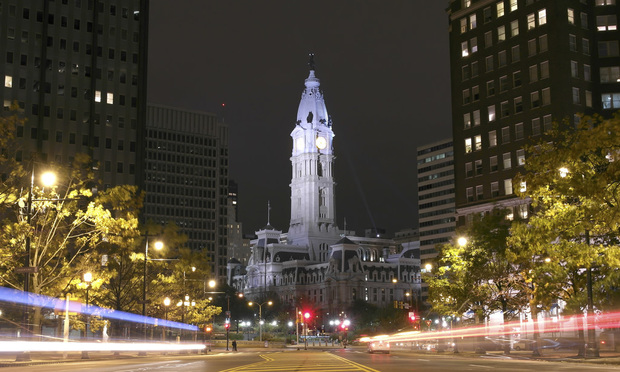Philadelphia Bar Association Sees Win in Judicial Primary
Philadelphia's primary was a big win for six attorneys in the city, but the candidates aren't the only ones claiming victory.
May 22, 2019 at 05:06 PM
5 minute read
 Philadelphia City Hall. Photo: Fotolia
Philadelphia City Hall. Photo: Fotolia
Philadelphia's primary was a big win for six attorneys in the city, but the candidates aren't the only ones claiming victory.
Three judicial candidates who received “highly recommended” ratings from the Philadelphia Bar Association effectively won spots on the Philadelphia bench during Tuesday's primary vote, and for the first time in eight years no “not recommended” candidates received enough votes to make it through to the general election.
“We're very proud,” Philadelphia Bar Association Chancellor Rochelle Fedullo said. “We think this is a wonderful public service, and we're proud of the outcome.”
According to the Department of State election results, Dilworth Paxson lawyer Anthony Kyriakakis, Elliott Greenleaf shareholder James Crumlish and longtime family attorney Tiffany Palmer each won spots on the general ballot, which all but guarantees them spots on the Philadelphia Court of Common Pleas. Each of those candidates received “highly recommended” ratings.
Community Legal Service attorney Jennifer Schultz, Joshua Roberts of Datz & Roberts and attorney Carmella Jacquinto also effectively won spots on the Philadelphia bench Tuesday. Those three candidates were rated as “recommended” by the bar.
Given that ballot position has historically been the most influential factor in judicial races, the Philadelphia Bar Association has long sought to raise awareness of its Commission on Judicial Selection and Retention, which investigates and studies the candidates' body of work to provide the nonpartisan ratings. According to court watchers, this year the bar association succeeded.
“A lot of the story that should be told is the impact of the bar association's 'highly recommended' ratings,” election law attorney Adam Bonin said. “For everyone who decries the process of judicial elections, it's hard to complain too much about this.”
Ballot placement still appeared to be influential in the race. Schultz, who was the overall lead vote-getter—earning more than 8.1%—was first on the ballot, and Roberts, who was second on the ballot, was the third-highest vote-getter. But Kyriakakis won 7.9% of the vote—the second highest of all 25 candidates—and he was 16th on the ballot. Palmer and Jacquinto were also 20th and 21st.
Daniel Fee of the Echo Group said the 2019 primary was somewhat unique because usually the marquee mayoral race drowns out the electorate's attention span for down-ballot races—judicial races in particular. But, with a low-key mayoral race in 2019, voters had more bandwidth to pay attention to the judicial races.
“They weren't being inundated with ads for the mayor's race,” Fee said.
Still, Fee said he noticed the bar association's presence more during the race, especially on social media.
“If you're the only one talking, you win, and with some of their social media, they were really some of the only ones talking to these voters,” Fee said.
Fedullo attributed the bar's increased pull to several factors, including a new social media initiative, a bigger presence in the general media—including radio interviews and references to the rating system in The Philadelphia Inquirer—and a redesigned handout, which featured, for the first time, the candidates' ballot position next to their names.
“It was much more user-friendly. It just looks better and it's easier to read,” Fedullo said of the handout.
Fedullo said she also got positive feedback from voters at the polling places where she helped hand out the ratings list, and some of those who declined the handouts said they already had the list on their phone.
Bonin said he also saw increased voter awareness of the bar's ratings at the polling places.
“Anecdotally, I saw people walking past people who were handing out materials for individual judges, but when the attorneys said 'I'm here with the bar,' people eagerly grabbed [the ratings list],” Bonin said.
The Pennsylvania Bar Association did not fare quite as well when it came to effectuating their ratings in the voting booth.
For the statewide Superior Court race, the only candidate rated “highly recommended,” Philadelphia Judge Daniel McCaffery, won a spot on the November ballot, as did Cumberland County Judge Christylee Peck and Megan McCarthy King, a deputy district attorney in Chester County. Both are Republican candidates who received “recommended” ratings.
The top vote-getter for either party, however, was Amanda Green-Hawkins, an Allegheny County lawyer who received a “not recommended” rating.
The PBA's judicial commission said Green-Hawkins has been successful in state and federal court, and that she is known for having a “strong work ethic.” However, the commission said she lacked the “experience and preparation to take on the role of judge on the Pennsylvania Superior Court.“
Court watchers said that candidates from Allegheny County often do very well in statewide races because they get votes from large swaths of western Pennsylvania, whereas the hometown vote for Philadelphia candidates is usually limited exclusively to voters from Philadelphia.
Jeff Jubelirer of Bellevue Communications agreed, and said Green-Hawkins' “not recommended” rating might have had less sway since it was simply for a perceived lack of experience, rather than anything temperament- or character-based.
However, he added that since there will be very few exciting races to bring out the voters, party and geography are likely to play key roles in the general election.
This content has been archived. It is available through our partners, LexisNexis® and Bloomberg Law.
To view this content, please continue to their sites.
Not a Lexis Subscriber?
Subscribe Now
Not a Bloomberg Law Subscriber?
Subscribe Now
NOT FOR REPRINT
© 2025 ALM Global, LLC, All Rights Reserved. Request academic re-use from www.copyright.com. All other uses, submit a request to [email protected]. For more information visit Asset & Logo Licensing.
You Might Like
View All


Stevens & Lee Hires Ex-Middle District of Pennsylvania U.S. Attorney as White-Collar Co-Chair
3 minute read
Judge Tanks Prevailing Pittsburgh Attorneys' $2.45M Fee Request to $250K
5 minute readTrending Stories
- 1Law Firms Expand Scope of Immigration Expertise, Amid Blitz of Trump Orders
- 2Latest Boutique Combination in Florida Continues Am Law 200 Merger Activity
- 3Sarno da Costa D’Aniello Maceri LLC Announces Addition of New Office in Eatontown, NJ, and Named Partner
- 4Friday Newspaper
- 5Public Notices/Calendars
Who Got The Work
J. Brugh Lower of Gibbons has entered an appearance for industrial equipment supplier Devco Corporation in a pending trademark infringement lawsuit. The suit, accusing the defendant of selling knock-off Graco products, was filed Dec. 18 in New Jersey District Court by Rivkin Radler on behalf of Graco Inc. and Graco Minnesota. The case, assigned to U.S. District Judge Zahid N. Quraishi, is 3:24-cv-11294, Graco Inc. et al v. Devco Corporation.
Who Got The Work
Rebecca Maller-Stein and Kent A. Yalowitz of Arnold & Porter Kaye Scholer have entered their appearances for Hanaco Venture Capital and its executives, Lior Prosor and David Frankel, in a pending securities lawsuit. The action, filed on Dec. 24 in New York Southern District Court by Zell, Aron & Co. on behalf of Goldeneye Advisors, accuses the defendants of negligently and fraudulently managing the plaintiff's $1 million investment. The case, assigned to U.S. District Judge Vernon S. Broderick, is 1:24-cv-09918, Goldeneye Advisors, LLC v. Hanaco Venture Capital, Ltd. et al.
Who Got The Work
Attorneys from A&O Shearman has stepped in as defense counsel for Toronto-Dominion Bank and other defendants in a pending securities class action. The suit, filed Dec. 11 in New York Southern District Court by Bleichmar Fonti & Auld, accuses the defendants of concealing the bank's 'pervasive' deficiencies in regards to its compliance with the Bank Secrecy Act and the quality of its anti-money laundering controls. The case, assigned to U.S. District Judge Arun Subramanian, is 1:24-cv-09445, Gonzalez v. The Toronto-Dominion Bank et al.
Who Got The Work
Crown Castle International, a Pennsylvania company providing shared communications infrastructure, has turned to Luke D. Wolf of Gordon Rees Scully Mansukhani to fend off a pending breach-of-contract lawsuit. The court action, filed Nov. 25 in Michigan Eastern District Court by Hooper Hathaway PC on behalf of The Town Residences LLC, accuses Crown Castle of failing to transfer approximately $30,000 in utility payments from T-Mobile in breach of a roof-top lease and assignment agreement. The case, assigned to U.S. District Judge Susan K. Declercq, is 2:24-cv-13131, The Town Residences LLC v. T-Mobile US, Inc. et al.
Who Got The Work
Wilfred P. Coronato and Daniel M. Schwartz of McCarter & English have stepped in as defense counsel to Electrolux Home Products Inc. in a pending product liability lawsuit. The court action, filed Nov. 26 in New York Eastern District Court by Poulos Lopiccolo PC and Nagel Rice LLP on behalf of David Stern, alleges that the defendant's refrigerators’ drawers and shelving repeatedly break and fall apart within months after purchase. The case, assigned to U.S. District Judge Joan M. Azrack, is 2:24-cv-08204, Stern v. Electrolux Home Products, Inc.
Featured Firms
Law Offices of Gary Martin Hays & Associates, P.C.
(470) 294-1674
Law Offices of Mark E. Salomone
(857) 444-6468
Smith & Hassler
(713) 739-1250





